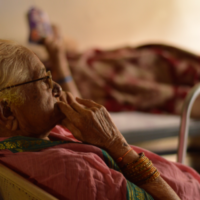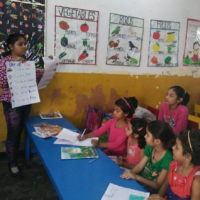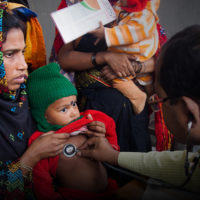
It’s said that too many cooks spoil the broth. But in the case of Bhagini Nivedita Parishad, every cook has added a new spice, which has only enhanced the flavor of the dish. These cooks were Pratima Joshi, Lalitha Marathe, Vaijayanthi Joshi, Rujuta Pitale, Pranoti Garge, Ushatai Sathe, Surekha Parande, Sulabha Deuskar, Nilima Karkhanis and Manjari Satpute – 10 ordinary women who came together to lend their skills to carry out and fortify the mission of this organisation.
It all began with Lilatai, the eldest in age as well as leader of these 10 women. Back in the 1960s, as she aptly put it, India was independent, most women were not. Moreover, life was a daily struggle for them. Being illiterate themselves, how could they think of giving their children a good education and bringing them up to their best potential? Lilatai believed that bringing womens’ social status up meant bringing that of society, as a whole, up too. Which is why she decided that she wanted to help women – especially those in need. She started off by associating herself with Bhagini Nivedita Parishad in Sangli. And later on set up the same in Pune.
While the organisation’s name has been borrowed from its Sangli-based setup, it it’s inspiration can be attributed to Sister Nivedita – an Irish woman who was an ardent follower of Swami Vivekananda. Sister Nivedita met Swami Vivekananda in 1895 in London and travelled to Calcutta in 1898. Swami Vivekananda gave her the name Nivedita (meaning “Dedicated to God”) when he initiated her into the vow of Brahmacharya on 25 March 1898. In November 1898, she opened a girls’ school in Bagbazar area of Calcutta, to educate those girls who were deprived of even basic education. During the plague epidemic in Calcutta in 1899 Nivedita even nursed and took care of the patients.
While the Pune-based Bhangini Nivedita was set up to help women, along the way, Lilatai realised that women were only coming to the organisation when their children were taken care of and they did not have to constantly worry about them. In order to help with the same, BNP ventured into childrens’ activities too. The organisation thus started off by setting up a creche, then ventured into hobby classes for children. Then came activities like nurse training, which would benefiit women directly. Over the years, over 10,000 women and children have benefitted from BNP’s services.
It’s been quite a journey, as I learnt from Lilatai herself, over a cup of tea at her house; with Mrs. Deuskar acting as my Marathi-English translator. She recalls, many years ago, a Government official came to their center to do a check and to qualify them as an official center. He said that to be an official center, one needed to have 400 square feet of classroom space. That’s quite a lot of room for an organisation like BNP, which had rather humble beginnings. But not one of give up easily, Lilatai very confidently told him to add up 4 separate classrooms of 100 square feet each!
Another incident when they left someone gaping in disbelief was when a beneficiary from their computers class (BNP was the first to start computer classes for women in 1993) went to the shop to get a computer repaired. By using words like “floppy” and “booting the computer”, she didn’t give him the chance to take her for a ride!
Finances were also a challenge too. This was one of the reasons why for about 20 of its 35 years, Lilatai’s house has served as its office with her family playing varying roles, thus silently showing their support for the good work that she started. The team recalls how on many a busy day, Lilatai’s husband himself has made tea for them!
Infact, Lilatai’s sister was approached for help too. Once, when the organisation was badly in need of a computer, they took an interest-free loan of Rs. 10,000 ( this was a fairly big sum back in the day) from here for 5 years – using half the money to buy the computer and the other half to invest so as to pay her back in 5 years time!
But as Mrs. Sulebha, one of the founding members said, “Obstacles can either be ignored or used for learning. We treated them as learning aids instead.” Interestingly, Lilatai’s inspiration stems from her own father who made helping people in need a part of his daily life. Without hesitation, he would give educational/other help to people who approached him. Ensuring a neighbor/domestic helper’s son had a text book for school was more important to him than savings for the future. Giving thus was ingrained in her at an early age and was a part of life for her and her family.
Lilatai is 88 years old today but still very much involved in the activities of the organisation – though age has forced her to play more an advisory than implementory role. “Whenever a thought or an idea strikes her, the very next moment, she shares it. She is open to the suggestions of other members and makes sure that they are implemented at some point.” says Mrs. Joshi, one of the founding members about Lilatai. I guess that’s what keeps her going! As I headed back to the guest house, I couldn’t help but think if a clear intention and passion were all that it took to create change and awareness amongst society? With the words of Margaret Mead echoing in my mind – Never doubt that a small group of thoughtful, committed citizens can change the world; indeed, it’s the only thing that ever has.
Established in 2000, Give is the largest and most trusted giving platform in India. Our community of 2.6M+ donors have supported 2,800+ nonprofits, impacting 15M+ lives across India.
Discover more from give.do
Subscribe to get the latest posts to your email.



